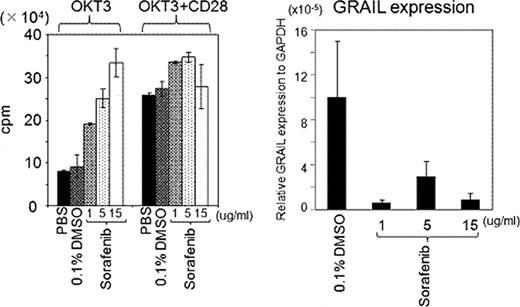Abstract
Abstract 1458
Combining molecular targeted drugs with allogeneic hematopoietic stem cell transplantation could be an attractive approach to treat diseases associated with a high risk of relapse after allogeneic transplantation. However, influences of molecular targeted drugs on immune function during the period around allogeneic transplantation remain obscure. In our experiment, tyrosine kinase inhibitor, sorafenib exacerbates Graft-versus-Host disease in mouse model when given following allogeneic hematopoietc stem cell transplantation (Blood in press). To explore the mechanisms of this phenomenon, we examined in vitro effects of sorafenib on proliferation of T cells. 3H uptake study showed that the addition of sorafenib did not alter mixed lymphocyte reaction, but when stimulated with anti-CD3 antibody (OKT3) alone, T cell proliferation was enhanced significantly in the presence of sorafenib (median Stimulation index: 4.6, range). This effect was disappeared when stimulated with OKT3 and anti-CD28 antibody. We hypothesize that this stimulatory effect of sorafenib would result from inhibition of T cell anergy. To test this hypothesis, expression of anergy related genes (DGKa, Itch, Egr2, GRAIL) in T cell was examined by RQ-PCR. After stimulation of OKT3 alone, expressions of these genes were increased but in the presence of sorafenib, GRAIL expression was decreased, while expression of DGKa, Itch and Egr2 was not changed. This result may indicate that sorafenib exacerbates GVHD presumably through inhibition of T cell anergy.
No relevant conflicts of interest to declare.
Asterisk with author names denotes non-ASH members.


This feature is available to Subscribers Only
Sign In or Create an Account Close Modal